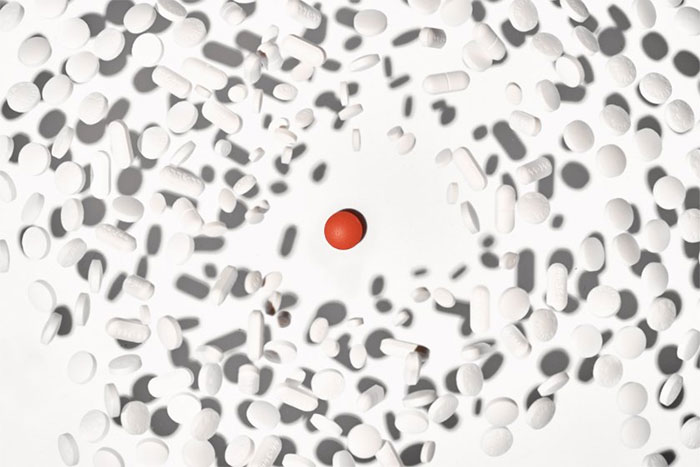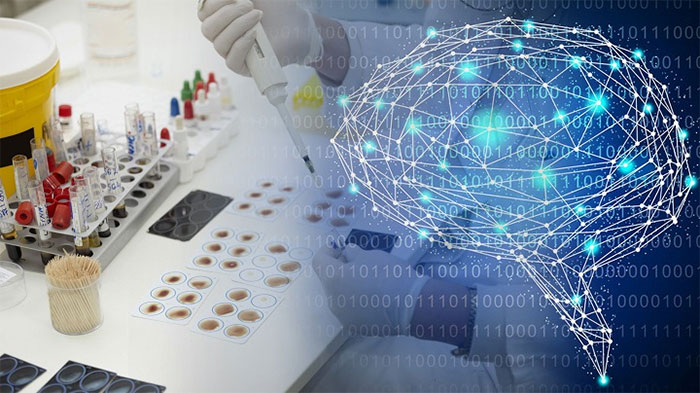Artificial Intelligence (AI) technology is transforming the entire pharmaceutical industry. This technology can save the time and money required to develop new drugs for treating Covid-19 and other serious diseases by rapidly identifying the most promising drug candidates.
In the case of Covid-19, AI software helped a pharmaceutical company successfully develop a treatment for the SARS-CoV-2 virus, which was approved in the United States in just 9 months—a remarkable speed.
A UK-based AI startup called BenevolentAI identified baricitinib, a drug developed by Eli Lilly for treating rheumatoid arthritis, as effective in treating Covid-19 within just a few days. This drug has been approved for the treatment of Covid-19 in the United States and Japan. The European Medicines Agency has also conducted evaluations of baricitinib for treating the coronavirus.

After identifying the target protein, AI will find a drug that can act on them.
The team of experts collaborated with BenevolentAI’s advanced AI to find an approved drug that could be repurposed for treating Covid-19. This approach allows pharmaceutical companies to bypass the FDA review process for emergency use of the drug in treating hospitalized Covid-19 patients in just 9 months, instead of the many years typically required. Discovering a new drug usually necessitates extensive research with numerous candidates and animal testing to assess their safety.
BenevolentAI’s technology identifies the most promising drugs through data from clinical studies, scientific reports, and databases of diseases, genes, and pharmacology. Once the target protein is identified, AI will find a drug that can interact with it.
The application of AI in drug research and development is expected to significantly reduce the time needed to create a new drug, a process that typically takes between 9 to 17 years.
In February 2020, as soon as the WHO declared Covid-19 a global emergency, BenevolentAI’s first study on the use of baricitinib for treating Covid-19 was published in The Lancet, showing that this drug could prevent the virus from infecting lung cells, thereby reducing pneumonia.
Eli Lilly, which holds the patent for baricitinib, and the National Institute of Allergy and Infectious Diseases conducted a study in the United States to test the drug’s effectiveness and safety in treating hospitalized Covid-19 patients. Because the study results indicated that baricitinib could shorten recovery time and improve symptoms in Covid-19 patients, the FDA granted emergency use approval for this drug in November 2020. According to data released by Eli Lilly, baricitinib can reduce mortality rates by up to 38% among hospitalized patients when used in combination with remdesivir, an antiviral medication.
BenevolentAI is also conducting its own research and development of drugs, focusing on treatments for over 10 diseases, including atopic dermatitis and unilateral scleroderma syndrome.
The company began clinical trials for its atopic dermatitis treatment in February 2021. It is also collaborating with AstraZeneca to develop a treatment for chronic kidney disease.
AI has been applied in pharmaceutical research and development worldwide. Sumitomo Dainippon Pharma partnered with Exscientia, a startup using AI for drug research, to discover a potential treatment for obsessive-compulsive disorder (OCD). Last year, the company began clinical trials for this drug in Japan to determine its safety.
“Thanks to AI, the process of discovering a new drug took less than a year, whereas normally this process could take up to 4.5 years,” an expert from Sumitomo Dainippon Pharma stated. In May 2021, the company began Phase 1 clinical trials for an Alzheimer’s treatment developed using Exscientia’s AI technology in the United States.

AI does not completely replace humans at all stages.
However, AI does not completely replace humans in all phases. Its role is to identify the most promising drugs and streamline formulations from a vast amount of data from scientific and experimental research. Humans will guide this process to research and develop the drugs.
Exscientia is attracting attention from pharmaceutical and biotech companies worldwide. Evotec, a German biotech company, has joined forces with Exscientia to develop a new cancer treatment. According to Evotec, the A2a receptor antagonist has been in human clinical trials since April 2021. The two companies discovered this drug just 8 months after starting their research.
The Japanese pharmaceutical company Taishio and the AI company Insilico Medicine from Hong Kong have collaborated on a research project since last autumn to find therapies that help slow the aging process of cells. Insilico uses its AI network to identify treatment targets and find drug-like molecules that target aging cells. The accumulation of these cells as people age is believed to be responsible for various diseases.
Insilico’s mission is to uncover the underlying factors of aging in specific cells, tissues, and diseases, with different proteins related to each target, and design molecules that intervene with those targets. Taishio will validate the results from the AI with tests on glass plates and living organisms.
Several other Japanese AI startups are also contributing to the success of leading global companies in the pharmaceutical field. Hacarus, an AI company based in Kyoto, and the University of Tokyo have participated in a research project for drugs treating Alzheimer’s and Parkinson’s diseases. Both diseases are caused by the accumulation of certain proteins in the brain. Using AI to develop drugs for these diseases is still quite rare worldwide.
The goal of the project is to create a system within a year that can more effectively search for compounds that could be potential drugs. The AI-driven approach will “significantly improve the speed and accuracy of the research process,” said Taisuke Tomita, a professor at the University of Tokyo’s Graduate School of Pharmaceutical Sciences.
More than 120 companies and universities in Japan have participated in the Life Intelligence Consortium, a business-school collaboration program aimed at applying AI to everyday science. This collaboration has produced around 20 AI program prototypes for pharmaceutical research and development.
“AI will soon become an essential technology in pharmaceutical research and development,” said Yasushi Okuno, a professor at Kyoto University. This technology creates opportunities to “reassess old knowledge that took up to 10 years to develop a new drug.”
As a result, each new drug developed becomes extremely expensive. According to estimates from Tufts University in the United States, the average cost to develop a widely used prescription drug was about $2.9 billion in the 2000s, compared to $180 million in the 1970s. The cost of drug research has been increasing faster than inflation.
In recent years, many new drugs have been developed, particularly for cancer treatment and “lifestyle-related diseases.” Numerous important active ingredients with therapeutic potential have been discovered and formulated into medications. Consequently, developing an effective new drug has become exceedingly challenging. Moreover, ensuring safety extends the research timeline for clinical trials.
According to the Japan Pharmaceutical Manufacturers Association, only about 30,000 potential compounds are actually used as drugs. The development process can take anywhere from 9 to 17 years. Companies spend approximately 10% of their sales revenue each year on research and development, which equates to about 4% for the entire industry.
In an effort to discover new treatment methods, pharmaceutical companies are allocating more resources to drug research that utilizes biotechnology—drugs with complex components that use living cells or microorganisms, often developed through advanced technologies, such as antibody-drug conjugates (ADCs). The process of researching biological drugs is very complex and also quite costly.
One such biological drug is Nivolumab, marketed under the name Opdivo. This drug was first used in Japan in 2014 for the treatment of various cancers, and initially, it cost up to 35 million Japanese yen (approximately 7.3 billion VND) annually for drug distribution. This situation has put additional pressure on the national healthcare fund, which already faces significant expenditures.
Artificial Intelligence (AI) is one of the technologies that can help reduce drug distribution costs by cutting research expenses. This, in turn, increases access to new treatment methods for difficult-to-treat diseases and improves the quality of life for everyone.




















































